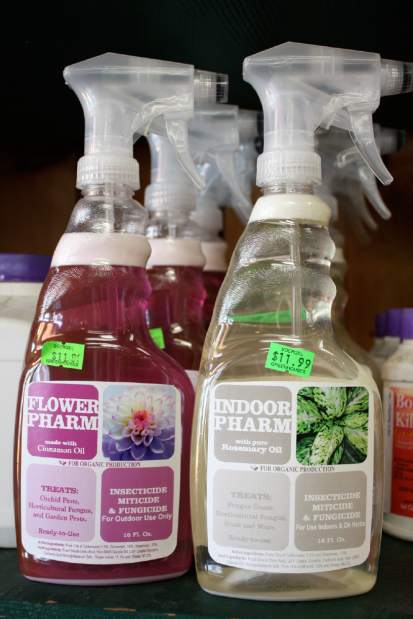Use those botanical pesticides with care
For hundreds of years, gardeners have been using plant-based pesticides to combat agricultural pests. We've crushed the flowers of Chrysanthemum cinerarifolium to create the broad-spectrum pesticide known as pyrethrin, and people have turned to Sabadilla dust (derived from the seeds of a plant in the lily family) since the 16th century.
With a few exceptions, botanical pesticides fell out of favor when synthetic chemical controls hit the market in the 1940s. But with many gardeners reaching for “greener” options, newer botanical pesticides are flooding the marketplace, and many companies are developing new blends of botanical pest-control products. In fact, you can find countless pesticides derived primarily from plants on the shelves of almost any nursery and garden center.
Even though Mother Nature had a hand in creating these products, don't be fooled into thinking that all botanical pesticides can be used lightly. Although most botanical formulas are considered safer than their synthetic counterparts, much care is needed when selecting and applying them.
Products like Rotenone (derived from plants of the Derris genus) have been linked to Parkinson's disease and pyrethrin is a potent nerve poison, and should be used only as a last resort. Another potential negative: some botanicals, especially when applied incorrectly, are as disruptive to beneficial insects and pollinators as they are to the bad guys.
That being said, there are some terrific, least-toxic botanical pesticides on today's market that are incredibly effective. Botanicals often are more desirable than their chemical counterparts, because they break down fairly rapidly, and many of them are certified for use in organic production. These products can be turned to when safe, natural remedies are needed.
• Hot-pepper wax is a botanical product used primarily as an insect repellent. The blend of capsaicin and food-grade paraffin wax is a metabolic stimulant for many different soft-bodied insects. Hot-pepper wax acts to repel pests for up to three weeks.
• Neem (or neem oil) is extracted from the seeds of the tropical Neem tree. It works as a pesticide and a fungicide, when used properly. Neem not only repels insects, but it suppresses feeding and prevents them from molting. It's effective against a broad range of insects, but, if applied when bees are active, it might be harmful to them.
• Garlic oil serves to repel insects, and should be applied before pests have arrived for the best results.
• Citrus-oil products must come in direct contact with pests to be effective, but they can be used right up to the day of harvest. The oil works by coating and suffocating insects, and some brands are even labeled for use against fire ants.
• Herbal-essential oils are made from various plant oils including clove, wintergreen, cinnamon, rosemary and peppermint. Some forms of these pesticides are used as a soil drench to control root pests like wireworms, while others serve as foliar pesticides applied directly to the plant.
When using any botanical pesticides in the garden, be sure to read and follow the label instructions carefully. And, remember, many of the insects living in the gardens are beneficial. Less than one percent of the insects found in your backyard are considered harmful. Always identify an insect first before you take action against it — the folks at the Penn State Extension Service are always more than happy to help (as am I, of course).
Horticulturist Jessica Walliser co-hosts “The Organic Gardeners” at 7 a.m. Sundays on KDKA Radio. She is the author of several gardening books, including “Grow Organic” and “Good Bug, Bad Bug.” Her website is www.jessicawalliser.com.Send your gardening or landscaping questions to tribliving@tribweb.com or The Good Earth, 503 Martindale St., 3rd Floor, D.L. Clark Building, Pittsburgh, PA 15212.

